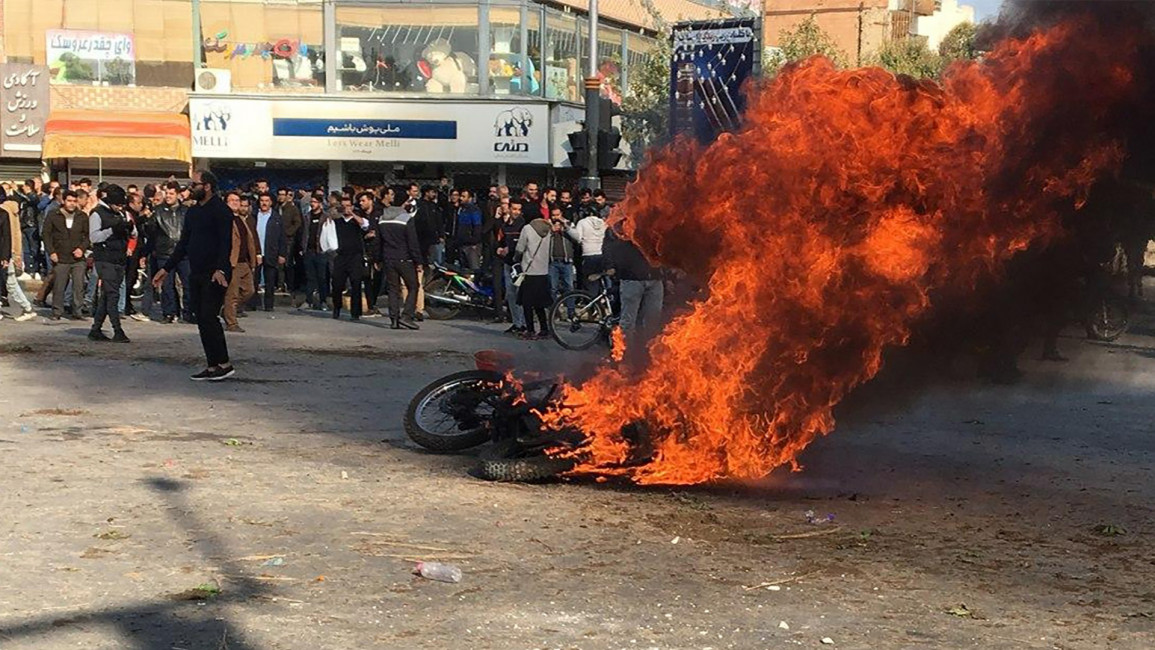Iran forces killed more than 220 protesters in two days: Amnesty
Iran forces killed more than 220 protesters in two days: Amnesty
Iran's security forces killed over 220 people over the span of two days during protests that shook the country in November 2019, Amnesty International has found.
2 min read
Amnesty found Iranian security forces killed the victims in 37 cities in eight provinces [Getty]
Iran's security forces killed more than 220 people over the span of two days during a crackdown on anti-government protests last November, Amnesty International said Wednesday, although the real death toll could be even higher.
Protests erupted across Iran from 15 to 19 November after the government announced a hike in petrol prices. A harsh crackdown was launched to quell the dissent using lethal force.
Amnesty said the crackdown left 304 dead, though it believes the real number could be much higher. Information gathered by the organisation found that security forces killed at least 236 men, 10 women, 23 children and 35 people whose gender could not be confirmed.
According to Amnesty's research, more than 220 of the recorded deaths during the protests took place on 16 and 17 November alone.
Amnesty also found that the killings took place in 37 cities across Iran, with poverty-stricken suburbs around Tehran seeing the most deaths. The provinces of Khuzestan and Kermanshah, which house minority communities such as Arabs, were also negatively affected.
Amnesty added that, save for two exceptions in one city, there was no evidence that protesters possessed firearms or posed a threat to security forces.
Even during the two incidents involving armed protesters, security forces continued shooting and killing unarmed demonstrators.
Evidence was gathered from videos, photographs, death and burial certificates, eyewitness accounts and people who knew the victims, as well as information gathered by human rights activists and journalists.
Iranian authorities have made "false statements" and state television "propaganda videos" claiming most of the victims were armed or "suspicious agents" working for the state's "enemies", according to Amnesty.
Iran's government has still not issued an official death toll for the protests, claiming this is due to the time-consuming process of categorising the victims based on the extent of their involvement in the demonstrations, Amnesty said.
Follow us on Facebook, Twitter and Instagram to stay connected
Protests erupted across Iran from 15 to 19 November after the government announced a hike in petrol prices. A harsh crackdown was launched to quell the dissent using lethal force.
Amnesty said the crackdown left 304 dead, though it believes the real number could be much higher. Information gathered by the organisation found that security forces killed at least 236 men, 10 women, 23 children and 35 people whose gender could not be confirmed.
According to Amnesty's research, more than 220 of the recorded deaths during the protests took place on 16 and 17 November alone.
Amnesty also found that the killings took place in 37 cities across Iran, with poverty-stricken suburbs around Tehran seeing the most deaths. The provinces of Khuzestan and Kermanshah, which house minority communities such as Arabs, were also negatively affected.
Amnesty added that, save for two exceptions in one city, there was no evidence that protesters possessed firearms or posed a threat to security forces.
Even during the two incidents involving armed protesters, security forces continued shooting and killing unarmed demonstrators.
|
Iranian authorities have made "false statements" and state television "propaganda videos" claiming most of the victims were armed or "suspicious agents" working for the state's "enemies", according to Amnesty.
Iran's government has still not issued an official death toll for the protests, claiming this is due to the time-consuming process of categorising the victims based on the extent of their involvement in the demonstrations, Amnesty said.
"The fact that so many people were shot while posing no threat whatsoever shows the sheer ruthlessness of the security forces' unlawful killing spree," said Philip Luther, Amnesty International's Research and Advocacy Director for the Middle East and North Africa.
"Six months later, the devastated families of victims continue their struggle for truth and justice while facing intense harassment and intimidation from the authorities."
Follow us on Facebook, Twitter and Instagram to stay connected


![Minnesota Tim Walz is working to court Muslim voters. [Getty]](/sites/default/files/styles/image_684x385/public/2169747529.jpeg?h=a5f2f23a&itok=b63Wif2V)




![Debris near Rafic Hariri International Airport [Getty]](/sites/default/files/styles/image_330x185/public/2176162423.jpeg?h=a5f2f23a&itok=MCSK9mkM)
![An Israeli air strike on Jabalia killed teenage journalist Hassan Hamad [Screengrab/X]](/sites/default/files/styles/image_330x185/public/2024-10/hassan%20hamad1.jpg?h=c12e0b96&itok=Rd_dyCVp)
